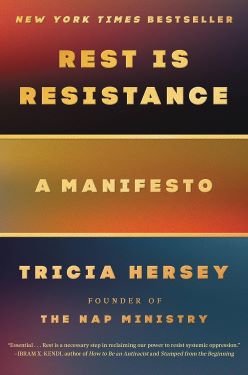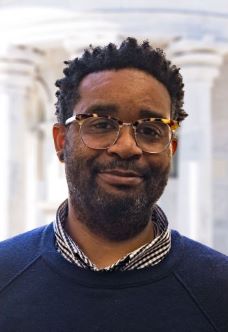A Little Cheese for Your Reading Pleasure
- Sarah Trembath
- December 30, 2024
“The Critical Reader” offers thought options for the New Year.

Happy holidays, readers! I hope you’re spending them exactly as you want. As I write this, there’s a dusting of snow on the ground here in Baltimore. I’m in my sweatpants and an oversized T-shirt, sitting down in front of a fireplace video on YouTube. I’m envisioning us in our home spaces, enjoying our warm beverages in the peace that comes with solitude or with milling about in someone else’s home, surrounded by loved ones in (hopefully) happy clamor.
Believe it or not, I’m seeing myself placing a cheese platter in your holiday space, wherever you may be. But instead of squares of gruyere and tiny little sausages, my platter has ideas for online reading in the new year. These aren’t my usual offerings about engaging our full intellective capacities during this age of mis- and disinformation. This holiday, I’m thinking about a new orientation toward self-care in the post-truth age.
I’m thinking of Tricia Hersey’s life-changing Rest Is Resistance: A Manifesto (2020) and what it might offer socially conscious, critical readers in the Trump II phase of the post-truth era, especially those of us who do a lot of reading online. Surely, we’re about to get even more inundated with things to fact check, counter, analyze, and research. We’ll probably feel stressed out and find ourselves wondering — over and over and over — what we can do to make a difference in this divisive, propagandistic informational situation.
“Lay yo’ ass down” and take a nap, the wise woman/author Hersey would likely advise.
She advocates for time spent in “dreamspaces,” those generative, imaginative zones that are only accessible when one can shut out the whole world, lie back, and rest. Hersey sees rest as a “form of resistance because it disrupts and pushes back against [the] capitalism and white supremacy” that took far too much from the elders in her lineage. Many of their lives were cut short by slavery, Jim Crow, and the overarching “toxic systems [that refused] to see the inherent divinity in human beings and [used] bodies as a tool for production, evil, and destruction for centuries.”
These systems demand all from the people subsumed by them, even in this day and age. Today, Hersey contends, most of us unwittingly participate in what she calls the “grind culture” that evolved out of past eras and can only be resisted by planned and purposeful and abundant rest, even from social media. Hersey asks:
“Can you imagine a few hours a day of not being connected to your phones or email inboxes? What feelings rise inside when you imagine it? What if this day was extended to a full day or a full week? A month? What would you replace the hours of online engagement with? Could a hobby be cultivated during this time that could give you pleasure? Would you have more time to daydream, rest, nap? Would you go to bed earlier? Does it feel stressful to think about not having your phone nearby? What has the pervasive nature of social media and cell phones done to our quiet time?”
Unfortunately, she continues, “social media has stolen our ability to exist without it. A perfect plan to keep us distracted and addicted…We as a culture spend countless hours a day on social media with numerous studies naming it as a digital addiction.” This is crucial to explore in the post-truth era: Half of us get at least some of our news from social media, about 1/5 of us currently get it from influencers, and we’re likely to continue to do so in some form or another.
So, let’s nosh on a few notions…a little cheese for reading that can help us regain at least some space for daydreaming and self-love in our grind culture while we remain up to date on important matters in the world around us:
- It’s important to realize that reading is an affective, embodied experience. According to a recent article at psychiatrist.com, our moods affect what we choose to consume online, and in turn, what we consume affects our mood. This can manifest as tension and stress. Recent psychiatric research confirms the link between “negative content consumption and worse mental health outcomes, including anxiety and depression symptoms. [It highlights that] browsing negatively valenced webpages exacerbate[s] participants’ mental health across various dimensions, including mood and psychological well-being.” In other words, feeling anxious about the news can lead one to doomscroll, and doomscrolling makes folks feel worse. We should do little of it.
- Of course, once we get going with the scrolling, the algorithms of social media send us more of what we’re already taking in. We’re probably better off, though, if we choose what we’re going to take in and not let algorithms do it for us. Reading books for pleasure is one way to balance our digital-information-seeking habits. If one were, for example, to read about a trend online and then go read a book on it, one would likely learn much more context about the concern and engage in the respite that reading a good book provides. It also feels like a bit of boundary-setting around who controls what we see and what we may come to think.
- Reading book reviews and intellectually engaging with the reviewers’ claims — as you also do — has to be a better process than the rapid-fire, anonymous influence of algorithms. By switching from the lightning-fast informational influence into slower, more purposefully engaged, more traditionally vetted and longer forms like books and reviews, readers may also reduce what was once called data smog — that difficulty we have sifting through the massive amounts of information that come our way each day. Conventional wisdom and science both suggest that online readers should set boundaries around screentime.
- Detaching from the doomscroll in some form or another also gives readers the opportunity to balance what they digest online with the benefits of other activities — like the dopamine boost that comes from watching cat videos, the brain stimulation of a walk, or the spiritual significance of a good nap. According to “nap bishop” Hersey, “When I take a digital Sabbath away from social media, I come back feeling smarter, less anxious, and tapped into an expansive energy I was unable to access while scrolling every day.”
Consider, then, the occasional social-media fast, as Hersey suggests:
“For those who are attached to your phones, start off small at first by blocking out two to four hours to be off all social media sites. By deleting the apps off the phone, or placing your phone in another room, tucked away in a drawer, you can increase your chances of finding a natural rhythm without the voices and noise that social media provides. Even if your timeline is curated to only include joyful, thought-provoking, and encouraging messages, detoxing is still necessary and valuable. Your mind needs rest.”
Hersey is not suggesting that we ignore the news of our world. She is not suggesting that we assume a passive posture in the face of social problems. She is, however, emphatically asserting that none of us will be in good shape to solve much of anything if we’re mentally exhausted. Solutions arise in dreamspaces.
And so, I join her in wishing you well: May your new year be a restful one full of your own dreaming.
Sarah Trembath is an Eagles fan from the suburbs of Philadelphia who currently lives in Baltimore with her family. She holds a master’s degree in African American literature and a doctorate in Education Policy and Leadership. She is also a writer on faculty at American University. She reviews books for the Independent, has written extensively for other publications, and, in 2019, was the recipient of the American Studies Association’s Gloria Anzaldúa Award for independent scholars for her social-justice writing and teaching. Her collection of essays is currently in press at Lazuli Literary Group.
